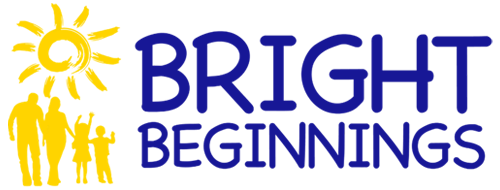Bright Beginnings engages families for child's success

The Division of Special Education and Early Learning's course trains educators and service providers to incorporate family members in interventions aimed at helping children reach identified goals.
In education, family support is an essential part of a child's success. Helping families find the best way to support their child is a vital part of the educational process. Bright Beginnings, a part of the Department of Education's Division of Special Education and Early Learning (DSEEL), is a family-centered, evidence-based model of early intervention that is primarily used in the Birth to Three program. Birth to Three serves children (from birth to 36 months) with developmental delays or disabilities and their families.
The Bright Beginnings approach puts a child's family at the center of interventions that are developed to help a child reach age-appropriate milestones. It embeds the interventions into the routines of the day, from waking up to going to bed. This includes routines at home, in childcare, and in other settings.
Jennifer Kampmann, a professional development specialist with the DSEEL, leads Bright Beginnings courses for school district staff providing services to children in need of prolonged assistance. Making family engagement a foundational part of a child's education creates what she calls a multiplier effect. "Children tend to meet their goals faster and the impact is longer lasting when the family is engaged in the process," she said.
The courses guide participants in strategies to enhance family engagement. Although the courses were developed for Birth to Three providers, the strategies can be used by K-12 educators as well. "If anyone is looking for ways to engage families in education, no matter the grade or age level, if they want to have families deeply engaged, then Bright Beginnings would be a good course for them," said Kampmann.
The first and most basic concept of Bright Beginnings starts with inviting the child's family to talk about the goals they would like to work on with their child. Once those are agreed upon, the educator or provider takes steps to include the family in the entire process of making those goals attainable. "Techniques we use in training have providers flip the script so that families can be actively engaged in every aspect of their child's intervention," she said. Parents are coached to be a part of their child's success; this affirms their confidence in their ability to support their child's educational goals.
Including a child's family in their education can do three things for the child, said Kampmann. "First, it allows kids to make progress faster as a whole because the whole family is working on the strategy. Secondly, it builds the confidence and competence of families to be a part of their child's educational journey. And finally, we're really showing those children by example that everyone in the journey wants them to succeed."
Bright Beginnings courses will be available for Birth to Three providers, and K-12 educators generally, beginning in January 2025. The course includes four weeks of guided instruction, with approximately 2-3 hours of work for each week. Those who successfully complete the course will receive 20 continuing education contact hours.
To register, visit Bright Beginnings 2025. Please contact Jennifer Kampmann at the Department of Education with any questions.
